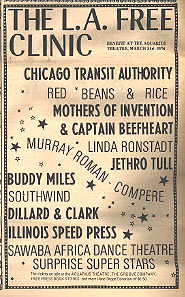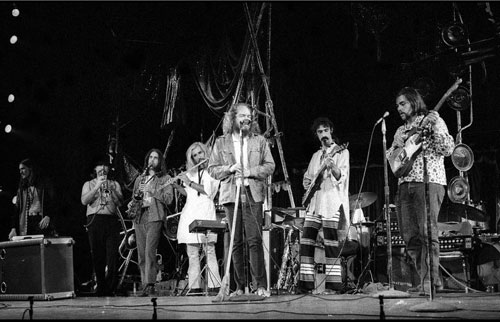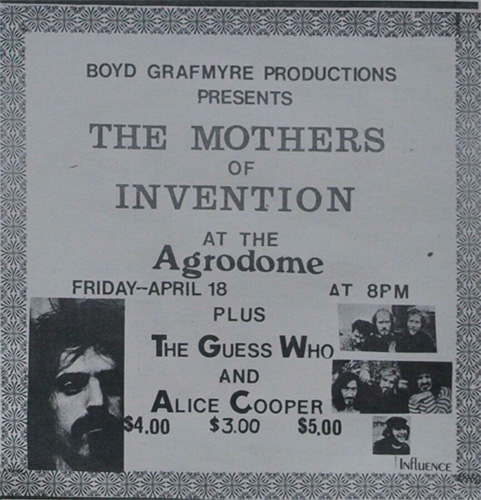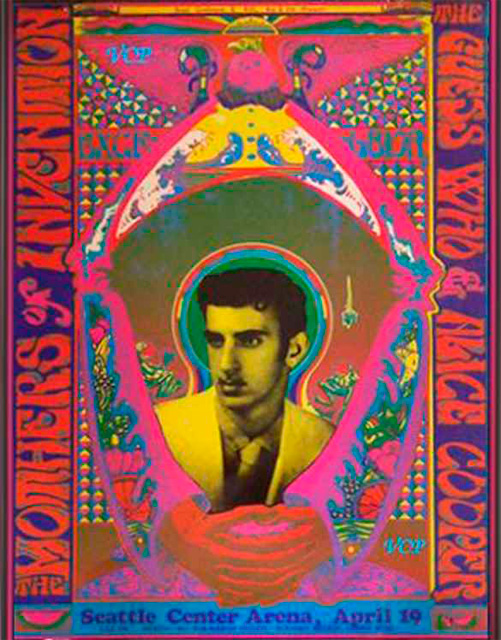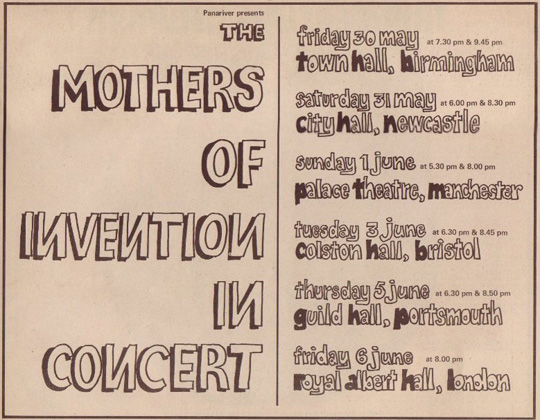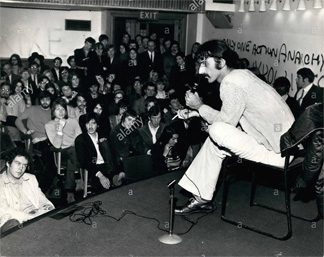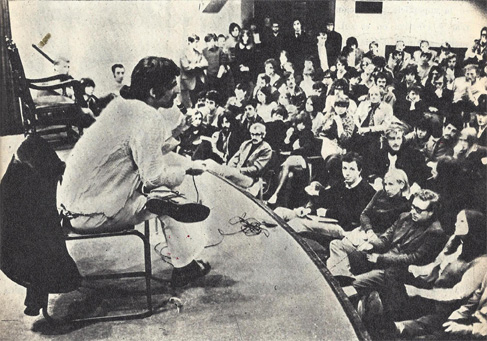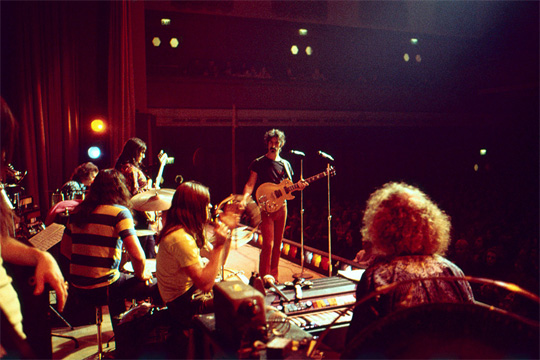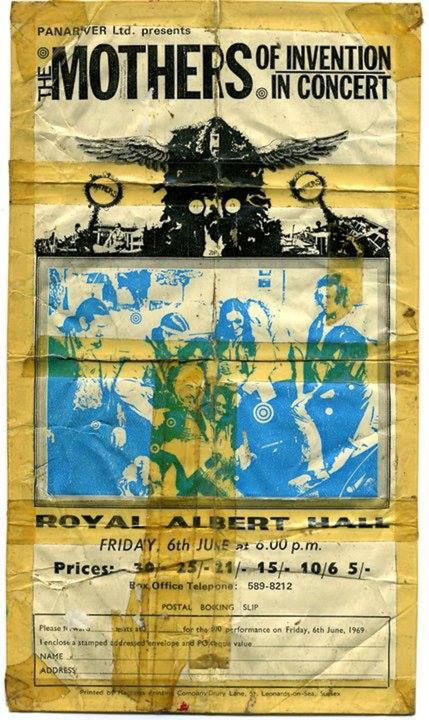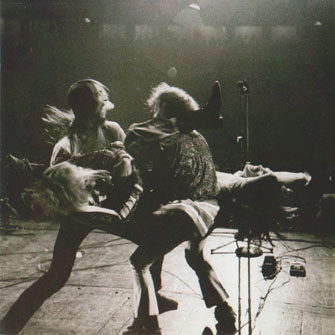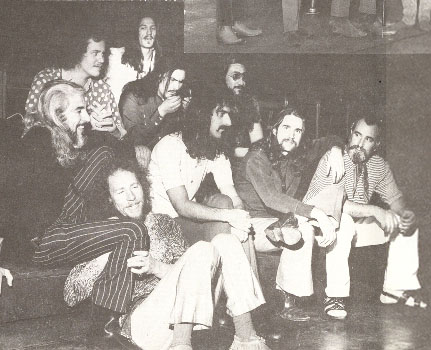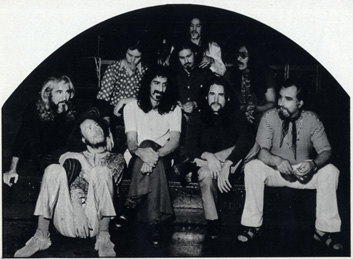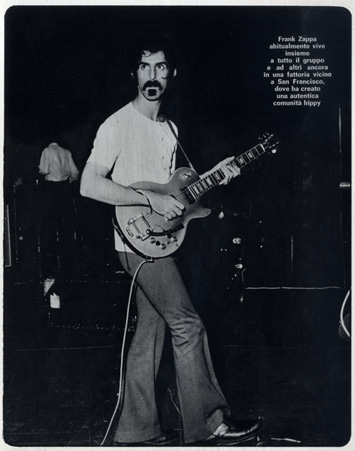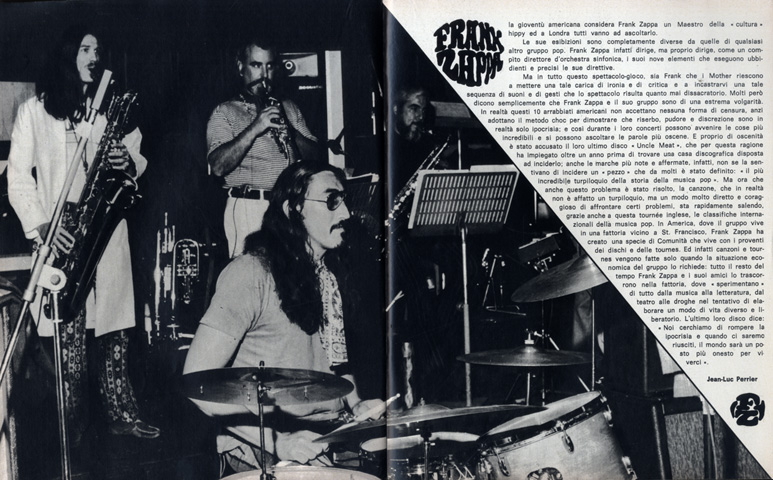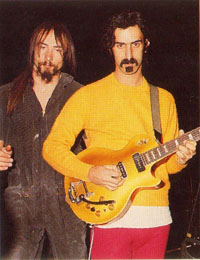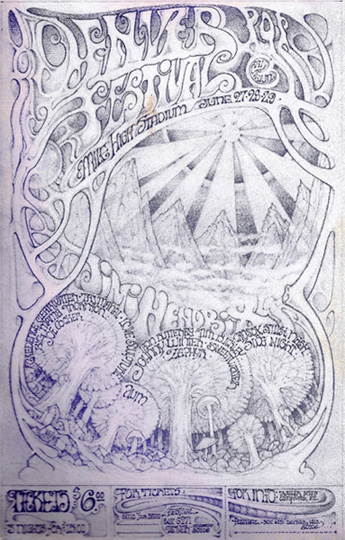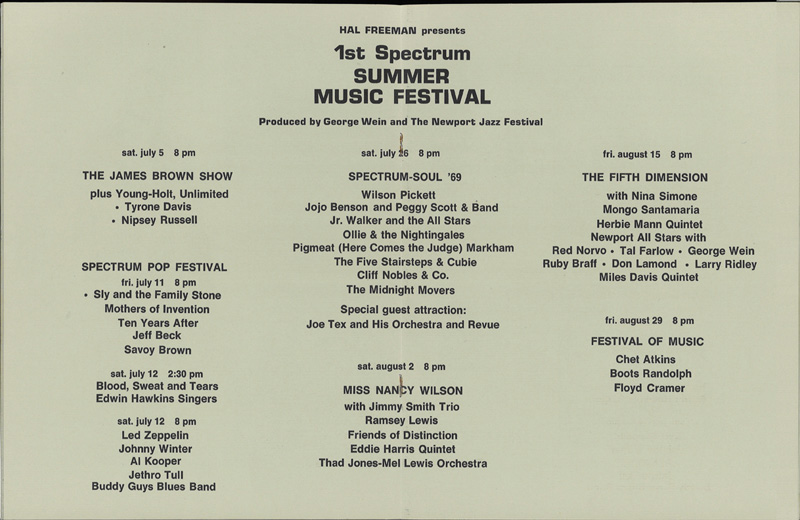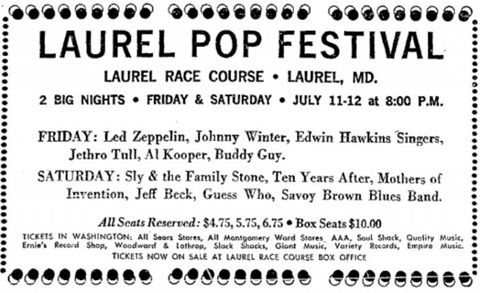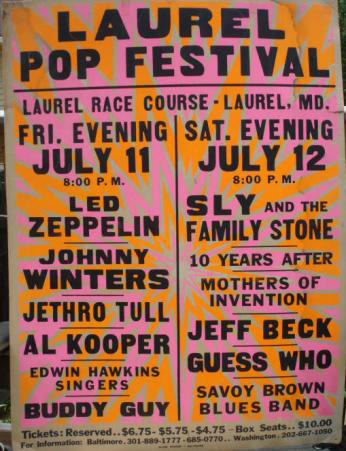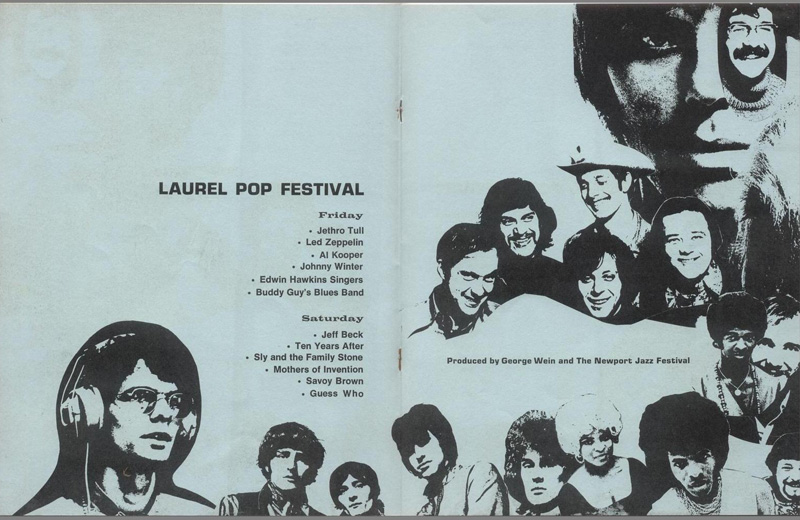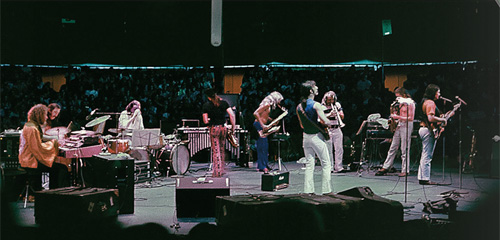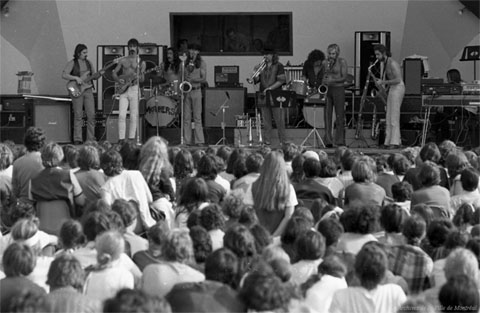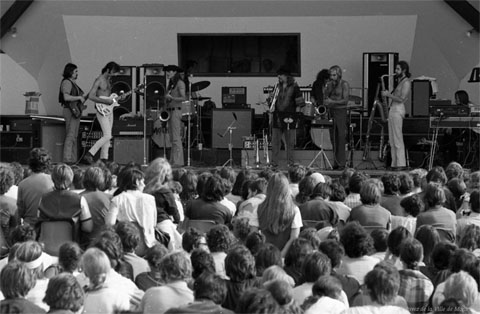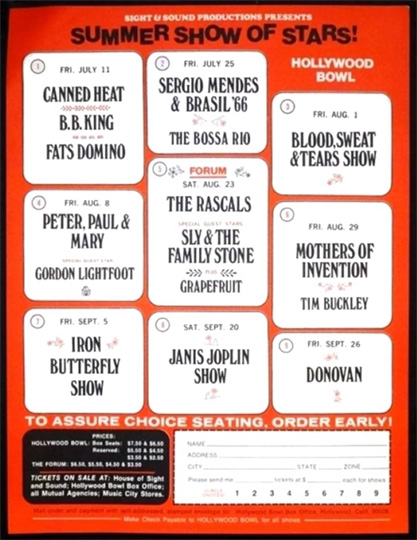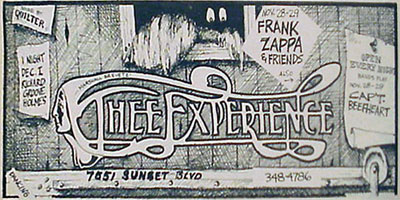Bizarre/Reprise & Straight
Reprise Records has obtained exclusive worldwide distribution to all product from Bizarre, Inc., recently formed by Frank Zappa and Herb Cohen. [...]
Reprise general manager Mo Ostin termed the agreement a milestone in the history of Reprise. [...] By terms of the agreement with Reprise, Bizarre will maintain complete artistic control over material, art work, and advertising, with Zappa in charge of all record production.
First release under the deal is slated next week, when a double-record album containing the last recorded performance of Lenny Bruce will be issued. Entitled "Berkeley Concert," it is the only complete recording of a Bruce concert available on disk.
The first Mothers Of Invention album is set for February.
Under the umbrella of Bizarre, Inc., general manager Herb Cohen will also serve as head of the management division. The parent company will hold personal management contracts with many of the artists signed to Bizarre.
Other members of the Bizarre staff include Neil Reshen, business manager; Joe Gannon, formerly with A&M Records, general manager of Bizarre Records, who will also work in the areas of management, concert promotion and television and motion picture production; Grant Gibbs, director of marketing; and Cal Schenkel, art director. Reshen is heading up the New York office at present.
Bizarre is maintaining a suite of offices at 5455 Wilshire Blvd. in Los Angeles and 150 West 55th St. in New York.
Zappa is curiously enough, for such an anti-establishment figure, an extremely acute business man. And one of the "cutest" features of the deal he negotiated with Warner Records is that at the end of their five-year contract the group get their masters back.
" . . . That's what I call a good deal," says Frank. "You make a record, and what normally happens is that the record company owns the tapes for ever—it's not your music anymore. I happen to like the idea of retaining my so called works of art."
Erik Gerritsen, "Frank Zappa," Hot Licks, December 1975
In 1968, disenchanted with his record company (MGM-Verve, with whom he is still battling out a royalties lawsuit), the Mothers switched to Warner-Reprise, who distributed Zappa's own labels, Straight and Bizarre.
WHY did you form the Straight label?
Well, Bizarre was basically the Mothers and other acts that I specifically wanted to produce. The deal with Warner's gave them first option on my productions. If they didn't like anything I produced we were free to put the thing out ourselves on any other label we choose. Instead of turning round and leasing out those other albums to another company we set up Straight.
We had our own independent distribution, and the problem any small company faces with independent distribution is that distributors don't pay. So at a point where we were having a lot of trouble collecting from the distributors, we renegotiated a deal with Warner's where they would take over Straight as well as Bizarre. Straight was however, originally designed as a completely independent operation outside of anybody else's distribution. We had separate deals for the label all over Europe which is one of the reasons why Straight would come out on one label here and Bizarre would come out on another.
Bizarre Records has signed five more artists to exclusive recording contracts, announces Frank Zappa and Herb Cohen, founders: Judy Henske, Jeff Simmons, Captain Beefheart, the GTO's and Alice Cooper.
Announcement of the signings was made concurrent with the release of Bizarre's first album, distributed by Reprise Records. The LP, a two-record set, is a recording of the last Lenny Bruce concert appearance titled "The Berkeley Concert."
Singer Judy Henske's first album for Bizarre is now being recorded in Hollywood by independent producers Jerry Yester and Zal Yanovsky. It is expected that the LP will be released in March. Jeff Simmons is a new discovery whose recordings will also be produced by the Yester-Yanovsky team. Bizarre is planning a major promotion for the young organist-singer.
Captain Beefheart's recordings will be produced by Frank Zappa.
The GTO's (Girls Together Outrageously) are a group of songwriters, performers and fashion designers who are being recorded by Frank Zappa for an album to be released in the spring.
Alice Cooper will be produced by Frank Zappa, who discovered the five-man group. A debut LP has been completed and will be released shortly.
Frank Zappa is now a businessman too. "I play the business game on the same terms as them," he told me. "I always wear a suit at business meetings, because you have to do that if they are going to take any notice of you." The Mothers now record on Frank's own Bizarre label which he hopes will solve the problem of the great time lag there has been between Mothers' albums being recorded and the record actually coming out. [...]
Bizarre records are now being released through Warner Brothers and the other Zappa label, Straight Records, are being distributed through CBS in Britain. Artists on Straight include Captain Beefhart and the GTO's while Bizarre has Wild Man Fisher, Lenny Bruce and the Mothers themselves on its books. "There is no separation between the clean and the weird on the two labels," said Frank, "as seems to be the case with Apple and Zapple—yes, it is a bit, isn't it? I don't make those kind of distinctions"
In addition to the record companies, Frank runs New Dawn management which handles the Buddy Miles Express and a film company, Intercontinental Absurdities.
January 24-25, 1969—Shrine Exposition Hall, Los Angeles, CA
Art Tripp, to Charles Ulrich, May 2014
We played the Shrine several times in that era. That particular gig may have been the time where Frank had half-heartedly orchestrated a sado-masochistic drama on stage during which he almost got whipped. Kim Fowley was involved, and a couple of them went overboard. The Gnarler (Dick Barber) had to come out and break it up to protect Frank. We just kept playing . . .
I remember those shows pretty well, since—despite the Fowley stunt—they were lots of fun. That's where I met Crazy Jerry—a speed freak who loved vibrations and electricity. He'd come up to me raving about the show. I asked him from where he watched it. He said that he'd spent much of the show underneath the stage on his back with his feet pressed up against the bottom of the stage floor. He did that so he could feel the vibrations. The guy was actually brilliant; and once you got past his veneer, he was a fascinating guy. After we realized he was harmless, he even stayed over once or twice at my place in Laurel Canyon. He had a legitimate prescription for injectable speed, which he carried in his boot along with his needle apparatus. He'd broken his ribs a couple of times in the process of bending steel re-bar across his chest.
According to Lowell [George], Frank Zappa's trip was shocking people, pushing them to their limits of tolerance. Lowell cited an example: the band was working a concert at the Shrine Auditorium in Santa Monica, scene of many former freak-outs. The first set went well, then the kids rushed the stage, and the band members became a little worried. In the second show Frank had a chick named Della come on stage. He asked for a volunteer from the audience to whip her. No one volunteered. Then Kim Fowley, an archetypal L. A. weirdo who requires a whole book to himself, offered his services, but he was refused. Finally an old road manager of the Mothers agreed to come on stage and beat the girl with his belt. Both the chick and the road manager got carried away, and soon he was flailing out at the rest of the band members who by now were bunched together behind their instruments. Kim Fowley got into the scene and was also whipped. By 2:00 A.M. the vice cops were in the wings waiting for someone to take off his clothes. The audience was enthralled. "You could just see rows of eyes and open mouths," recalled Lowell. Then on went the lights. End.
"There's a girl in Los Angeles named Della who likes to get whipped. She came to the Whiskey with a child, handed the child to somebody and said. 'Would you mind whipping me in the middle of the show?' and I said. 'Sure, if that's your idea of a good time.' When she came on she had on a little skirt, had some tights on, had this big belt and she wanted me to beat her while the band was playing. I MEAN beat her, BEAT HER, to hurt. HURT HER! And I [said] 'sure,' you know. 'anything to please.'
Finally she wanted me to hit her with the buckle. She was a nice person, she just wanted to get beat, so I took the buckle and went BOW, like that," as he demonstrates, "and she went flying across the stage, just rolled up into a ball screaming. We're just playing music," he says, looking around matter-of-factly.
"So about two months after that," he continues, drawing from his cigarette, "we're playing at the Shrine Auditorium and Della shows up again, and wants to get whipped. I say 'Nah, nah, I don't want to beat her, let's get somebody from the audience.' So I say. 'Is there anybody in the audience who wants to whip Della?' So Kim Fowley says. 'Hey I'm really far out, yeh, fantastic. I'll do it.'
He jumps up there and starts to beat her a little bit, but he's making a big dramatic production out of it and the girl just wants to get beat, you know, and he wants to be a star while he's beating her, and she's going. 'No way!'
Then this guy who's named Skippy Diamond, who's now a chiropractor in Los Angeles. Skippy's this guy with a head built like a barrel, about 5'7". Kim Fowley's 6-something, real skinny. Skippy walks up there, takes the belt away. Skippy's normally a mild mannered guy, takes the belt away from Fowley, doesn't beat Della, starts beating FOWLEY." Zappa says with wide eyes!
"And seriously. Fowley is on the floor with a microphone screaming for help at the audience and Skippy's beating HIM, then beating Della, wailing around the stage with this belt, you know . . . I'm just playing," Zappa finishes in laughter.
We played a show at the Shrine again [January 24-25, 1969]. Fleetwood Mac were on second [...]
That's also the gig where Frank had worked out a little skit for the stage which he was famous for. It was arranged for this girl named Gigi to come onto the stage. She was one of the chicks who hung out with The GTO's and she liked to be whipped with a belt. She was going to come on when we did 'Pachuco Hop' and get a little mocked whipping.
There was this guy called Skippy Diamond who was a friend of ours. The "Gentle Bear" was what we called him and he was a pretty-good-sized guy who used to be a wrestler. He had heard about what was going to happen, so he was standing over by Gigi. When it was time for this to all happen, he grabbed the belt and ran on to the stage and started wailing into the girl and the audience was going wild.
Kim Fowley, who just loved the limelight, was right in the front row and of course, he thought, "Hey, this is too good of an opportunity for me to pass up!" so he jumped up on the stage. As soon as Skippy saw him, he started wailing on him too because Skippy never really liked the guy!
The next person he started on was Frank and he managed to whack him a few times. I mean he was wailing on everybody you know, kind of temporarily insane. Frank was trying to get away from Skippy but there he is in front of five thousand people.
Skippy said, "Come on Frank, you started this so take your fucking medicine!" Now that's the second time when one of those little things that Frank liked to do backfired. I was glad that I was behind the drums and so was Artie.
Nika Rainier, January 17 & 22, 2022
In reading the online notes from Zappa and his bandmates...I see that they fabricated the facts surrounding the Shrine concert and the "whipping of Della"....I was there and "Della"was my best friend...THELMA ..whom Zappa pulled on stage after asking for the last virgin in the house. She was NOT whipped...but Fowley did whip others. She was so frightened that she had PTSD and thought Fowley resided in her closet for years. They made up the Whisky à Go-Go part too. I remember that night clearly as I danced with John McVie.
So ..after the night Zappa's guys pulled my friend on stage...some other friends and I met Kim Fowley on the Strip and he took us to a party at Zappa's house in Laurel Canyon which was adjacent to Joni Mitchell's. It must have been in the months May-September when he lived at the Tom Mix cabin. The walls were rough wood with quilts everywhere and I had forgotten about all of this till I read his book in the early 90s. It could also have happened before the whipping skit...and maybe why she was selected as an unwilling participant ....recognition.
January 31, 1969—Boston Globe Jazz Festival
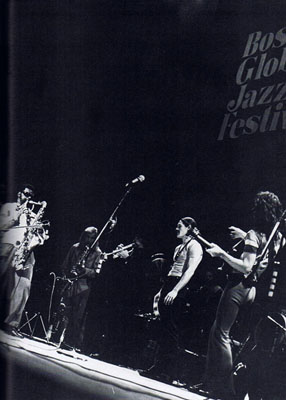
[The Mothers Of Invention] started very free—electronic shrieks and whines, scale-running from hornmen Ian Underwood, Bunk Gardner and Jim Sherwood, and some falsetto sing-song by electric bassist Roy Estrada. They settled into a jazz framework with a riff similar to the Jazz Crusaders' Young Rabbits. Short solos by Don Preston on electric piano and [Buzz] Gardner on trumpet (using the false low range, like Rex Stewart on Lion of Judah) . . . and then pandemonium broke loose as Kirk wandered out and jammed with them for the rest of the night. All stops were out; [Rahsan Roland] Kirk wailed, the Mothers dug it and responded with uncanny support. Free stuff, Kirk weaving in and out of the flow of sound patterns into which Frank Zappa directed his crew. Basie riffs by the reeds, a raunchy stripper blues with Kirk sounding as raspy and earthy as he ever has. Zappa instantly picking up Kirk's concepts and playing telepathic guitar counterpoint. Choreography: high-kicking, everybody on his knees, everybody on his back. Tune ends, crowd goes bananas, "More! More!" Okay: All Night Long. More of the same, only different. After this one, and a short sardonic rendition of Louie Louie (with the lyrics of Plastic People), the audience was close to berserk. Wein had to close the curtains, turn up the house lights and beg them to leave, which they ultimately, happy-sadly did.
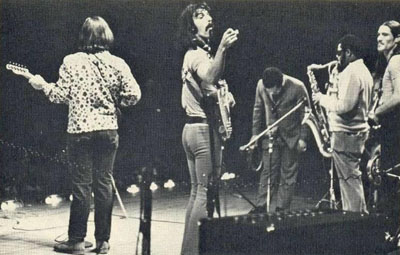
That particular set is lost forever, but Kirk and Zappa are crazy if they don't make a record together. The Mothers are capable of many other things—so is Kirk—but this was too much, and nobody with half an ear who heard it could ever again say that jazz and rock can't combine without damagine one of the idioms. An incredible, exhilarating, exhausting, exciting set.
I read in Down Beat that you did a 45 minute set with Roland Kirk at a Boston Jazz Festival. Were you billed together, or did you just play together because Kirk was there?
We were on the same show and I met him after he had done his part and said "Would you be interested in playing with us?" And he said he didn't know. And I said "Well, you've never heard the group before—you don't know what we do. If you like it—come on out on stage and start playing, and we'll back you up". So we'd played for about five or ten minutes and he came wheeling out there with horns hanging all over him and blow his brains out.
It was completely free—nothing planned.
No, he just came bopping out there and we did it.
Got any plans to record together?
Well, he asked us to you know, but we haven't gone ahead with any special schemes yet.
I met [Roland Kirk] at the backstage of Boston Jazz Festival, and asked him to play together if he was interested in our music. Then, during our set, led by his attendant, he came up to the stage. As you know, he's blind. But his body understood all of our signals. At one point, everybody in the band was supposed to get down on their back and kick their feet in the air while they still keep playing. As soon as we got on our back, he also got his back. When we got up, he also got up. He grasped everything. He is an excellent musician. Three weeks later, we played together again in Florida Jazz Festival.
The first time we played with Rahsaan Roland Kirk was at the 1968 Boston Globe Jazz Festival. After his performance, when introduced to him backstage, I said I really liked what he was doing, and said that if he felt like joining us onstage during our set, he was more than welcome. In spite of his blindness, I believed we could accommodate whatever he wanted to do.
We began our set, wending our atonal way toward a medley of 1950s-style honking saxophone numbers. During this fairly complicated, choreographed routine, Rahsaan, assisted by his helper (can't remember his name), decided to join in.
We played at the Boston Globe Jazz Festival with Dave Brubeck and Roland Kirk the night of my thirty-first birthday on February 1st.
Roland sat in with us for a jam and we played a song called "Behind The Sun" where Roland, Bunk, Ian, and Motorhead were all on their backs honking away just like the old days.
Frank Zappa & The Mothers Of Invention with special guest Rahsaan Roland Kirk at The Boston Globe Jazz Festival January 31, 1969. Recorded by yours truly on a portable Sony reel-to-reel that I smuggled into the event.
Tracklist:
00:00 - Intros and tune-up
02:25 - Improvisation
06:33 - King Kong (w/ Roland Kirk, he joins at around 16:00)
29:14 - Improvisation (w/ Roland Kirk)
34:00 - Pachuko Hop
35:30 - Behind the Sun
44:57 - All Night Long (w/ Roland Kirk)
51:19 - End of the tape
The sound quality is quite good for a 1969 audience recording, but the tape seems to have seen better days. I'd rate it B+, B/B- for the flawed parts: there is some tape damage, including speed fluctuations, particularly in the second part of the recording. As for the concert itself, as one can imagine, it's definitely something special. This is one of the best versions of "King Kong" I have ever heard!
According to a newspaper article, The Mothers played "Plastic People" as an encore, but it's not on the recording.
Copen9370 adds:
"Kirk's percussionist Joe Habao Texidor plays on this show. He's mentioned as being the guy who walked Kirk onstage during the Zappa show. He's told the story more than once. He says that when 'everybody on their backs' happened, Kirk asked him 'what are they doing now?'. Texidor: they're all playing lying down on their backs'. So Kirk did the same"
January-March 1969—East Coast Tour
February 7-9, 1969—Thee Image, Miami Beach, FL
February 14, 1969—Columbia University, NYC, NY
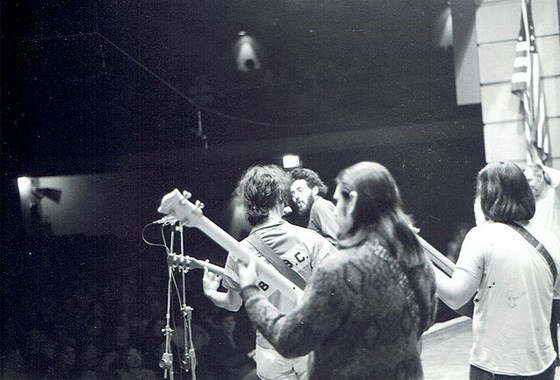
[FZ, Sam The Sham, Roy Estrada, Lowell George, Buzz Gardner.]
Joe Spivack, "Zappa And His Mothers," Columbia Daily Spectator, February 18, 1969
Zappa's main ability is to bring order out of apparent chaos. Columbia's more academic musicians could learn something from him here. On stage with him is a tremendous collection of equipment and musicians, whose appearences vary from mildly to intensely ugly. These men are apparently doing more or less what they want at any given time. Yet at the center of it all is Zappa, the ugliest of all, managing to control it with his gesticulations. He points to an unmanned instrument, and immediately someone plays it. He gives a signal, and the whole band swings into a new section. Zappa plays not merely a guitar, but a whole band.
And it's quite a band. It includes vocals, obscene pantomines of the best sort, guitars and bass, a brass section, two drummers with assorted gongs, vibes, electric piano and organ, and a small electronic sound-synthesizer. All are of course super-amplified, and all are played by complete professionals, for only those who can keep up with what Zappa wants make it in Zappa's band. As the trumpeter remarked, "With Frankie, you've got to be ready for anything."
So the key to it all is what Zappa wants. The material used is of two sorts. First there is a fair number of set tunes, mostly short riffs repeated ad infinitum, which include good soft 50's rock, self-consciously far-out horn solos, and horn choruses that sound like Kurt Weill's stage music. Second, thre are "free" passages, in which Zappa will indicate the instruments and the style, and the musicians will play what they want within the limits set. The combinations that Zappa indicates are remarkably varied, and this, coupled with the versatility and imaginativeness of the musicians, sustains interest for quite a period of time. Unfortunately, this never quite lasts a whole show. By the end, the audience has heart it all: the band is playing cliches, even if they are cliches of a very peculiar sort. Further, individual sections tend to go on too long.
But Zappa himself, like James Brown, manages to keep the audience with him past the point where the music loses interest. His whole presence is designed to give the impression that whatever he does next will be more improbable than the last thing. And most often it's true.
Sharing the bill with Zappa at Friday's Winter Weeken Concert at McMillin was Meat, Schwartz, Rothstein, & Co.'s latest incarnation.
February 15, 1969—Drew University, Madison, NJ
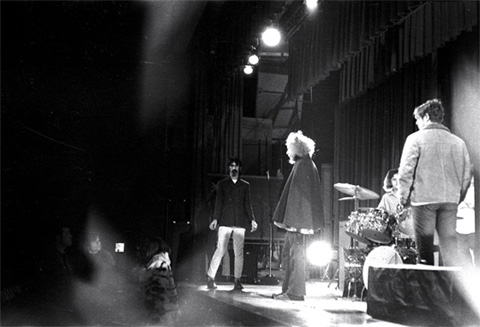
My memories of this concert (written in 2009):
[...] As a well-obsessed 15 year old, I arrived with my friends 5 hours early only to be met with a college wrestling match (auditorium setting, awful acoustics). Shortly thereafter, the bus rolled up and Frank graciously let us talk to them and even watch them rehearse in their dressing room—Ian and Bunk playing a very tightly performed piece (sorry, wasn't familiar to me) while Frank conducted. Got to see them setup and rehearse.
During the show, I sat next to Suzy Creamcheese (Zarubica) in the front row, right in front of Frank. The concert was extensive and introduced to me to the full spectrum of Frank that you didn't entirely get from his initial albums. The oddity was that a large number of people were booing and heckling consistently throughout, which you could see was taking a bit of a toll on them but they performed such a heartfelt version of their "Cheeeseeburrgers" call and response, that you could tell they were saying it with daggers in their hearts. Perfect. Apparently, the crowd disliked his 20th century classically influenced pieces and Dada performances. Never ever saw that again—this was a University crowd—Drew U in Madison, NJ—for god's sake!
Afterward, I went out back and found their bus (security was non- existent back then, natch) and motioned to Frank—he had earlier promised to meet me afterward—and upon recognition came out and talked with us for about an hour. He was very negative about the crowd—I think this was a worse response then he expected even with his intentional crowd provoking activities. [...]
I saw them a week later at the Filmore East, all four shows (2 on Friday, 2 on Saturday) and, if there was booing, I have no memory of it—I remember it as exhilarating for me as I sensed it was for the rest of the audience.
February 16, 1969—The Ballroom, Stratford, CT
February 21, 1969—lecture at New School, NYC
Zappa was guest lecturer on Friday at 6 p.m., just before the Fillmore concert, at a joint meeting of my History of Popular Music class and Charles Hobson's Afro-American Music class at the New School. The public was invited, as they will be for four other concerts and lectures this semester, and after a few polite moments, they started getting into him with questions about his relationship to the public, the revolutions, and why all the funny stuff. Did he ever think about the possibility of becoming another Mozart? Does he like the Beatles' music? The answers can be heard on a WBAI re-broadcast in a couple of weeks, but I'll reveal that, according to Zappa, he puts all that different kind of stuff in his music because it gives him a kick to hear it and because he likes to laugh. At any rate it was a wild set, and it ended with an audience member's sudden comment, "But you're so human! I thought . . . "
February 21, 1969—Fillmore East, NYC
If you're one of the people who groove to all music in a fairly intelligent-but-visceral manner the Mothers were storming your soul last weekend. They are probably the best equipped musicians in rock and roll. They can not only play r&b, new classical jazz, and sigh-ka-delic to perfection, but they also create in them. The speed tonguing of the horns in "Uncle Meat" was breathtaking. As usual, Don Preston, the number one keyboard man on the pop scene was raging in his solo on electric piano. The piece grew and swept all before, except of course the Mothers' r&b fan faction. All of the funny stuff—Motorhead and Roy Estrada screeching, singing opera, and felltiotizing an alto sax—was on the beat, in the right un-key, and at the psychologically right time in the piece.
February 22, 1969—Fillmore East, NYC
That was a great night. In fact, the two nights we played there, all four shows had stuff in it that looked so outrageous. And I came up with maybe two albums out of those two nights. Just crazy. I wonder where that chick is? . . . One night we improvised an opera . . . [...] Her name was Shirley Ann. She used to sing in Sweden. I don't know whether she made records . . . [...] She was standing backstage talking with Jimmy Carl Black who tried to get in her pants one time when we were in Sweden and she wasn't going for it, you know, so he was hustling her and when he wasn't meeting with too much success back there he decided he would finally introduce her to the rest of the members of the group. So he said, "This is Shirley Ann, and she sings." So I said, "Sing." So she sang a couple of bars and I said, "Would you go on stage with us?" We had to really con her into coming out there. She said, "What'll I sing?" I said, "Whatever you want." So she started off singing, "I am made of fire and air, come and touch me . . . " [...] She was making up this weird stuff. So Lowell (George) started singing duets, with her, Motorhead was snorking . . .
I met Marianne that night [Stockholm, September 30, 1968]—phew, what a beauty! A classic Scandinavian six-foot tall blonde, an absolutely gorgeous woman but she wouldn't let me in her pants—although I could eat her all night if I wanted to!
[...] Maryanne was there [Central Park, New York, August 2, 1969], the girl I had met on the '68 tour of Europe—the Swedish girl that wouldn't let me fuck her but would let me eat her pussy. She got up on the stage and sang with us and she was a good singer. She was doing all these kind of operatic things that consisted of noises and nonsense.
She went back to the hotel with me again after the show and still wouldn't fuck me. I guess it just wasn't meant to happen.
February 23, 1969—Rock-Pile, Toronto, Ontario, Canada
Ritchie Yorke, "4,000 Jamming Rock Pile Enjoy Mothers Keeping It Clean," Globe Mail, February 24, 1969
The Mothers were straight, and it didn't seem to disappoint two capacity houses at the Rock Pile. Packed in like a bunch of grapes, more than 4,000 people—some of whom had lined up for over an hour—watched as the Mothers proved themselves to be excellent musicians.
[...] During a 40-minute song, facetitiously titled "String Quartet," [FZ] acted out the traditional conductor role, singling out members for solos, ceremoniously, waving the group into tempo changes.
But the most amusing part of the Mothers' performance was the group doing its parodies (or were they sendups?) of mid-fifties rock 'n' roll—the era when groups woo-woo-waahed their way through almost everything.
The Mothers offered several selections in this vein, including "Lonely Nights" and "White Port and Lemon Juice," adding to the vocal parodies with some hilarious choreographed stage movements.
In Toronto in March, the Mothers of Invention played two concerts at the Rock Pile. The first was innocuous, but at the second show a former member of the group simulated sexual intercourse with a girl who turned out to be his wife, then for a finale turned his back and dropped his trousers. Rock Pile manager Rick Taylor, 24, didn't like it, but he didn't try to stop it. "Are you crazy, man? Just picture me trying to stop it in front of 2,000 fans.
"I do think it was kind of an insult to members of the audience who'd paid $3 each to see a musical group. They didn't pay to see someone's backside." Taylor says, however, that he would take action if a group member attempted to masturbate on his stage. "I'd ask my stagehands to stop him, and if they refused, I'd keep on moving up the staff ladder—firing people. By that time I figure the artist would probably have finished anyway, and I wouldn't have to stop him."
One girl who was at the Mother's concert disagreed. "I mean, tough luck. Who cares if a guy takes his trousers off? Plenty of worse things can happen. Big deal." (She didn't want her name to be mentioned in case her mother should see it.) Frank Zappa of the Mothers of Invention is equally unconcerned. "The incident was simply something unpremeditated, unexpected even by the Mothers.
The guy wasn't even a member of the present group. And he just came on up and did it. What could we do?"
I worked for Frank in Toronto, Canada where I did an opera with Roy Estrada (bass player for the Mothers of Invention), at the end of the gig I give the audience my butt, I pulled my pants down and gave them a B.A. It was a fine rendition, the place was shredded, the audience was clapping for 10, 15 minutes. We even had to come back and give an encore. I remember there was an encore.
Another [memorable moment] was the night I introduced Frank Zappa at the Rockpile Club—Toronto's version of the Fillmore. In the course of his set, during an extended improv break, Frank came back out on stage and peed all over the front row of the audience—literally pulled his dick out and pissed on them! No one complained. They all wore it in the literal sense of the word.
February 28, 1969—The Factory, The Bronx, NYC, NY
March 2, 1969—Philadelphia Arena, Pennsylvania
March 15, 1969—Cal State, Fullerton, CA
Gordon T. McLelland, May 6, 2024
Mothers of Invention. Alice Cooper. The Stack. 1969 Cal State Fullerton concert.
I just turned 18 years old and was still in High School when the concert happened. John Gardell (College Concert Productions) dealt with the management for The Mothers of Invention and Alice Cooper for the booking. John knew Herb Cohen but I just met him once or twice and did not deal with him. I recall Zappa gave us a choice of the opening act. Could have been Captain Beefheart or the GTO's but I selected Alice Cooper for the show because the album cover art for the record they just released was by Ed Beardsley. I knew Beardsley's nephew around that time.
The package deal on the bands included us hiring Alice Cooper to play at our small dance/concert club in Buena Park called the White Room. That event took place on the Friday night before the Mothers / Cooper show on Saturday night. I did the poster art and light show for that event and all White Room events.
On the morning of the Saturday night concert event John Gardell called me. He asked me to pick up the keys to the auditorium at Cal State Fullerton and let the Mothers of Invention into the venue at 12 noon. I rushed to get the keys and drove to Fullerton as quick as I could. As a matter of fact, from previous experience with rock and roll bands, I did not expect the Mothers to be on time and frankly thought they would be late and arrive stoned out like many or possibly most of the bands at that time.
To my great surprise when I pulled up in front of the auditorium the band equipment and band members were waiting at the front doors. As I moved toward the doors to open them Frank Zappa approached me and let me know in no uncertain terms he was very pissed off that I was 15 minutes late.
I then helped some guys carry music equipment to the stage. While moving the drums Jimmy Carl Black and I talked for about 15 minutes. I explained the situation of me being asked to open the place at the last minute and got there as soon as I could. He was very nice and told me all was ok but that Frank did not tolerate anyone being late and if anyone was stoned or had drugs they were out of the band.
The band set up reasonably fast and I listened to them practice all afternoon. On breaks Zappa and I spoke about the light show and his wishes to have at least a few spot lights for the band. There was no chit chat, just going over when the Alice Cooper band was scheduled to arrive and what the band members wanted in the back-stage room. Actually I found the guy a bit intimidating both in the way he looked at me and in his general vibe, but it was interesting to have some interaction with him anyway.
Must say it was quite an experience to see Zappa directing the band members and working out what appeared to be musical ideas for transitional sections in tunes and between songs. There didn't seem to be any doubt he was the director of it all and to be the one who improvised and made most of the offhand comments. I've seen maybe 100s of band practices but never one like that. It lasted for nearly 3 hours.
On top of it all some guy named Wild Man Fisher showed up and demanded to be let into the auditorium. That guy looked and acted very sketchy. He said he was with Frank Zappa. I checked it out with the Mothers bass player who was also pretty friendly and sure enough the Fisher guy was a guest of the band. I let him in and later saw him on stage with them. Quite an odd addition to the show to say the least, but then the whole musical night was pretty crazy and unconventional for a rock concert.
To open the show there was an Orange County based band named The Stack. They were quite good at playing straight forward aggressive rock and roll and had a pretty large following. I knew the members and had done a number of light shows and poster concert graphics for them. Their opening performance was excellent as usual.
The Alice Cooper band had arrived reasonably early and had their musical equipment ready to set up and do sound checks before the show. As previously mentioned I had already met them and did a light show for them the night before at the White Room. That's just to say I was already familiar with their wacky Dada style vaudeville stage performance.
I recall the drummer having a large set of steer horns attached to his bass drum. There were also various stage props for Vince to use for certain songs. On one song in particular I recall they had a sort of piece of wall and a window. Vince peeked through the window and kept saying something like "nobody loves me," and then the other band members would answer "yes we do" or "no we don't" or at least something like that. Kind of Surreal . . . kind of psychedelic . . . kind of comical.
Both nights Vince had a bit of makeup and wore a see through nitt macrame sort of shawl or dress-like thing. No one called him Alice at that time that I was aware of; just used the name Vince. As I recall their performance pretty much caught everyone off guard both nights, as it was definitely not like anything else I was aware of at the time and the music was somewhat rock and roll but not like the usual approach at the time.
One thing for certain, they did perform with real conviction which caused me to recall the Dada performances I had read about in Europe and consider Alice Cooper shows of that time in that context.
There was a bit of a wait between Alice Cooper and the Mothers as the stage had to be reset. Since that was the only live Mothers of Invention show I experienced I have nothing to compare the show with. That said, from my standpoint it was an amazing experience to see and hear them live and consider myself very fortunate to have had that opportunity.
Frank Zappa was very intense at times and obviously took what he was doing seriously. His occasional sarcastic or witty comments were an interesting addition to the performance. The band played very well and did things musically that were innovative and engaging. Pretty much everyone I spoke with after the show was stoked.
At some point during the Mothers performance something odd happened. For some reason the Fullerton city police were a bit aggressive that night and wanted the house lights turned up. They claimed people were smoking pot, which very well may have been true, and insisted at least some lights were left on. That light sort of messed up some of my projection effects. I probably could have made more concessions with them on the lighting situation but it did not happen before the following event took place.
Frank Zappa decided to confront the police over the microphone on the issue of turning up the lights. He came to my defense and made some pretty derogatory remarks about Orange County conservative police. I can't exactly remember what it was that he said, but for sure they were confrontational remarks. I assumed he was just trying to help me out and I appreciated the efforts, although what he said was like throwing gas on the fire!
All that said, the light show went quite well. The name I used for that light show was The Great Brain Robbery. What I projected on the walls (360 degrees) for all the bands were slide images of non-objective psychedelic art I painted. There were also some liquid projections and various strobe effects.
Jon Mooney, "Mothers Of Invention To Perform Saturday," The Titan, March 14, 1969
Frank Zappa, the Al Capp of rock and roll, and his Mothers of Invention are coming to CSF for a one-performance-only concert Saturday at 8 p.m.
Appearing with the Mothers is Alice Cooper and The Great Brain Robbery light show. Tickets for CSF students can be purchased today for $2,50 in the AS office, or at the door Saturday night.
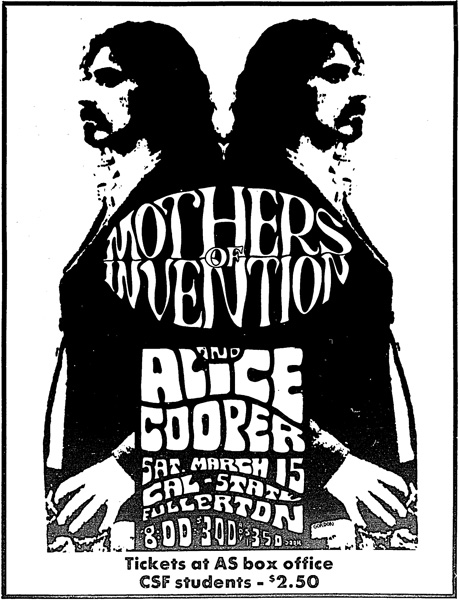
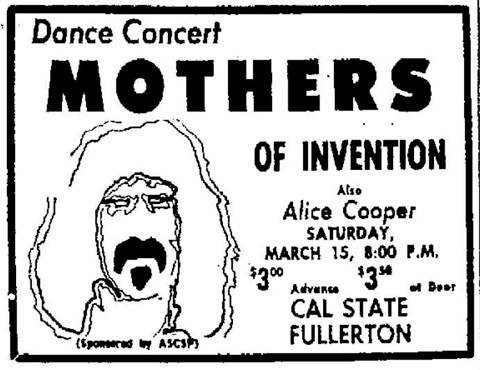
"With Spirit," The Titan, March 18, 1969
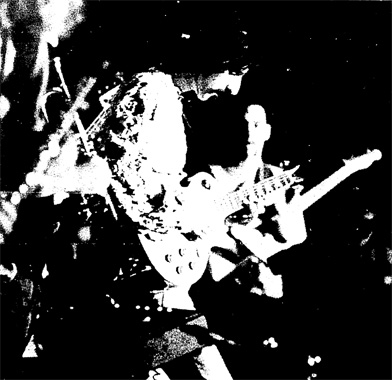
Titan photo by Bruce Bagnoli
Frank Zappa performs at the AS pop concert Saturday night. More than 3,000 watched Zappa and his Mothers of Invention in the second spring concert presentation.
We played a show at Fullerton College in California. Ian Underwood wasn't at the gig because he had caught the Flu pretty bad. "Wild Man" Fischer played with us on that show and Dick Kunc gave me a copy of that show. Some years later, that tape seemed to disappear. Later, I saw a bootleg album which contained exactly what was on that tape.
Gordon McClelland, May 4, 2024
John Gardell and myself booked and promoted that show, I provided the poster art and did the light show that night.
The Poster
Gordon McClelland, May 6, 2024
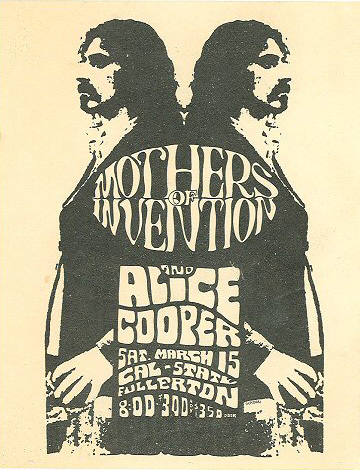
As for the poster graphics made to advertise the concert in 1969. The poster design you show in the website with Zappa looking both ways is the only poster image used to advertise the show. The poster of that image is 11 x 17 inches, black ink on thin white paper and was printed by Lightning Print in Fullerton. There is also a smaller 8 x 11 flyer version printed with black ink on a thick green paper. Those are the only two authentic graphics that were used to advertise the event.
The small advertisement also shown on your website I believe was generated by the Free Press at the last minute before they went to press. John was supposed to have mailed them the poster image but flaked out; so they ran that funky little ad in its place.
The Rick Griffin about 14 x 22 poster graphic in red and black ink, with Frank Zappa and Alice Cooper listed as bands is a commemorative poster, designed and printed in 1973 at Burbank Litho in Santa Ana. It was printed to be sold as a Rick Griffin poster graphic and was part of a line of Griffin posters sold through the California Graphic Exchange , a poster distribution company I established with Rick Griffin in 1971 to distribute posters mostly designed by Rick Griffin, Mouse & Kelley, Victor Moscoso and a few by Robert Crumb.
The third version I am aware of is a cardboard boxing style poster around 14 x 22 inches. That is a fake poster and has nothing to do with advertising the concert we produced in 1969. It was not authorized by either John Gardell or myself, but was bootlegged. In fact I don't recall even seeing it until after 2000.
Hope this helps clear those issues up. Sincerely Gordon T. McClelland
Informant: Javier Marcote.
April 20-23, 1969—International Music Industry Conference, Nassau, Bahamas
IMIC's Attendee Count: 600; Countdown Starts for Lift-Off
NEW YORK—The International Music Industry Conference in the Bahamas beginning Sunday (20) has already drawn more than 600 attendees. The Paradise Island Hotel & Villas and the Britannia Beach Hotel & Beach Inn on Paradise Island are sold out and late registrations are being booked into the Nassau Beach Hotel, one of the top hotels in Nassau.
[...] The Conference, which will run through Wednesday (23), is being co-sponsored by Billboard and its London-bases sister publication Record Retailer.
ARGUS: What kind of speech was that you gave to the record companies?
Zappa: You mean at the convention?
ARGUS: Yeah.
Zappa: Well, they asked me to speak on "Appreciating the Underground Arts" which I thought was absurd. But they flew me down to the Bahamas and paid my hotel bill which was $64.00 a day and that's a ridiculous price even for a hotel with a gambling casino and I was there for a couple of days before I actually talked and when I did, there was no room left in the hall. Some people waited outside to see what would happen. Some people sat through it twice. It was like a panel discussion. There was me, the head of MCA, the President of Tetragrammaton and the. . .it was moderated by Hal Bennett who's the President of Liberty Records.
They were all talking about subjects having to do with the relationship of youth to popular music. All most of the record companies were interested in was music, they didn't give a damn about who made it. And I pointed out the fact that most of them treated the people who recorded for them like they were a bunch of creeps.
So after I'd spoken one guy gets up in the audience and says "We in the record industry thing that you long-haired guys are a bunch of creeps." And I said "Well, we think you're a bunch of old farts." So he cracked up and so did everybody else man.
Directly after that another guy gets up to say something and he starts out like this: "My name is Stanley Orticoff [Gortikov], an old fart at Capitol Records." So from then on at the convention, old fart was the big thing. "How you doing, old fart?" Really it was magnificent.
I had a chance to meet a lot of record distributors; they're a comic lot. I talked with the guy who owns Korvette's. He said, "Well, we have a little problem getting your records on the rack. Really hard with the Uncle Meat album. But well, we like to put them out there, and I liked your speech a lot. Sure would like to sell your records in your store, but it ain't worth fuck in there."
"Well, how would you like it if we were to put a sticker on the album that said 'This album is rated X' like they do with films, you know." And he said, "Well, that would probably get us off the hook."
He really has quite a reasonable point of view. First of all he says 'fuck' and everyone who works in the store says 'fuck' but a record is like a public work of art, A book, one person at a time reads a book, its a private experience. You play a phonograph record in a house and it says 'fuck' and ten people in the house hear it and somebody's going to complain about it, you know, and he says they have a lot of problems with the people in New Jersey. There's a lot of church groups and they're about that. Well, the last thing in the world I want to do is offend someone from a New Jersey church group. So I'm thinking of putting a sticker on that says "This album contains commonly used words of everyday English. If this offends you, then be advised that this album is not for you. But they sort of sneak onto the racks and keep on selling in spite of the church groups.
May 17-24, 1969—East Coast
May 19, 1969—Massey Hall, Toronto, Ontario, Canada
Jack Batten, "Boss Brass Is Merely Brilliant; Zappa's A Wizard," Toronto Star, May 20, 1969
Zappa brought nine musicians to town this time, a smaller group than he offered for his concert last winter at the Rock Pile, and they played five numbers. Two of them were funny but dispensable parodies of 1950s rock 'n' roll, while the other three were long, exhilarating and complex compositions that ransacked through John Cage, free jazz, the Theatre of the Absurd, hard rock and Zappa's own special genius.
The three long pieces—"A Pound for a Brown-Out on a Bus," "Eye of Agamoto" and "The Return of the Hunch-back Duck," if you care about titles—suggested that Zappa works in the style of Duke Ellington.
[...] "Eye of Agamoto" [...] was launched with a freelance, instantly improvised ballet that employed four dancers (all of them band members), some plastic masks, a couple of brassieres and two rubber ducks.
May 24, 1969—Rock Pile, Toronto, Ontario, Canada
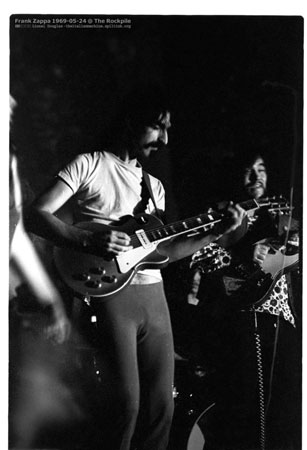
[FZ, Lowell George. Photograph by Lionel Douglas.]
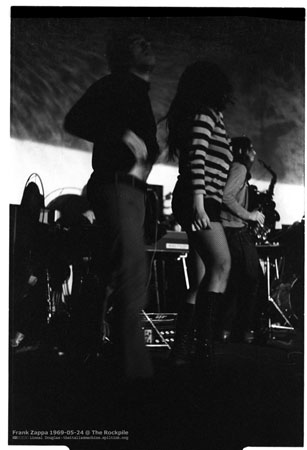
[Carl Franzoni, unidentified girl, Ian Underwood. Photograph by Lionel Douglas.]
Denis Griffin has discovered that the guest vocalist's name is André Beauregard.
Yves Leclerc, "Mais qu'est-ce que les Mothers ont encore invente?," La Presse, Montreal, August 21, 1969
Près de lui, il y a un garçon au veston rouge phosphorescent qui tantôt, à la fin du "show", est monté sur scéne et s'est mis à chanter en français. il s'appelle André Beauregard, il est copain avec les Mothers, et c'est la troisième fois qu'il chante sur un de leurs spectacle.
Au debut, c'est surprenant, ensuite c'est assez bon et après trois ou quatre minutes ça devient trop long. Beauregard n'a pas vingt ans, il a rencontré les Mothers à New York il y quelques mois: "Il voulait chanter, personne ne l'écoutait. Il se tenait avec nous, alors nous lut avons dit: "Vas-y", et nous l'avons fait chanter, deux fois à Toronto, et aujourd'hui à Montréal" explique Zappa, le plus simplement du monde. Continuera-t-il? Personne ne le sait.
Google Translate:
Near him, there is a boy in a phosphorescent red jacket who, at the end of the "show," went on stage and began to sing in French. his name is André Beauregard, he is a friend of the Mothers, and this is the third time he has sung on one of their shows.
At the beginning, it's surprising, then it's pretty good and after three or four minutes it becomes too long. Beauregard is not twenty, he met the Mothers in New York a few months ago: "He wanted to sing, no one was listening, he was standing with us, so we said, 'Go ahead,' and we made it sing, twice in Toronto, and today in Montreal," says Zappa, simply in the world. Continue there? Nobody knows it.
May 1969—Lowell George
Russ Titelman was starting a publishing company and he asked me if I wanted to co-publish the tune ["Willin'"] with him and see what he could do with it. So I recorded it and went on the road the same day with The Mothers and was gone for about five weeks I guess. Then I came back and nothing happened, but somehow a demo of the tape got out and it was the rage of the Troubadour.
Lowell George, ABC FM Australia, c. 1978
I never did [submit "Willin'" to FZ]. I was always smart enough to not submit it. But he did hear it once, and a few days later I was offered to start my own band. Which was a nice way of firing me, I think.
[...] Most of the [first Little Feat] album was demos. "Willin'" was a demo I did when I was in the Mothers. Matter of fact I did it the morning before we left for Passaic, New Jersey, or someplace like that.
[Lowell George] stayed with us for about eight months, just up until the time that we went to Europe. In 1969 Frank gave him his walking papers so to speak, told him that he thought Lowell ought to start his own band—I told him at the time that if he did, he should call it 'Little Feet' because he had little bitty feet. And, as it turned out, that's pretty much what happened.
Lowell had a band in California called the Factory, guys that had opened for us on several occasions. Lowell was very young at the time. He stayed with us for about four months, just up until the time we went to Europe. Frank gave him his walking papers so to speak. He told him he thought Lowell ought to start his own band. I told him at the time that if he did, he should call it Little Feet because he had little bitty feet. And as it turned out, that's pretty much what happened.
I actually got to know Lowell [George] way before he joined the Mothers. He had a band called The Factory and I used to go up to their house on Lookout Mountain Road in Hollywood and trip out on LSD. We were already trippin' pals before he joined the Mothers and in fact, he used to room with Roy Estrada and myself. In the One Fifth Avenue hotel in New York in early 1969 we were rooming together when he wrote most of "I'm Willin." It has always been one of my favorite songs of his. I have even recorded it a couple of times.
Lowell [George] was a great friend of mine and one of the most talented people to ever grace the music industry. We became friends when Lowell joined the band. I was responsible for forming Little Feat. I introduced him to all the guys but because of my strong relationship at that time with Warner Brothers Records, I arranged his first record deal with the label. History was made.
The next thing we hear is that Lowell won't be coming to England with us! Frank had cut him loose. Frank told him it was time he started his own band and it broke Lowell's heart because he wanted to go to England so bad. Man! It just devastated him! We were never given a proper explanation for it because he wasn't fired—he was just cut loose! Frank had never kept a second guitarist in the band for any length of time. I believe that Frank really didn't want another guitar player in the band. He was also doing most of the vocals by then. Lowell was cool about the whole thing and he did what he was told—like everybody did in the Mothers!
The drug references, first and foremost, I think that put Frank off. But Frank dug Lowell. I mean, he liked him, so he knew "Willin'" was a good song, and that Lowell really ought to be putting his talents elsewhere, and if Frank could help on that, then that's what would take place. I wasn't exactly sure in the beginning how much or what Frank was doing behind the scenes to help us, because . . . well, we took a year before we wound up at Warner Brothers, for example.
Lowell George was not exactly fired but rather let go and it is true that FZ advised that with his talent as a performer, musician and songwriter he should put his own band together—And it is true that he did assist in many ways. [...] Lyrics were never an issue and in fact FZ frequently supported at his own expense everyone's right to freedom of speech and every artist's right to artistic expression.
Bill Payne, Jeff Simmons & Lowell George
In late spring of 1969 I took a drive from Isla Vista, a community hosting students going to UCSB just north of Santa Barbara, to Los Angeles that was to change my life forever. [...]
A few weeks prior, using a phony credit card, I had placed a call to Bizarre Records, Frank Zappa's label, in Burbank. I told her I played piano and organ and that music was my life. I wanted to join Frank's band, the Mothers Of Invention. Frank and the boys were heading to Europe, however, she said, and it would not be possible to meet with him at that time. She must not only have heard the anxiousness in my voice, but somehow accepted the fact I had the talent to be given a chance. She gently steered me in the direction of the band Eureka, on Frank's other label, Straight Records. A few days later, I met with Eureka's leader Jeffrey Simmons at the Tropicana, a seedy rock and roll hotel, on Santa Monica Blvd. The meeting was unsuccessful—in addition to playing guitar, Jeffrey also played keyboards and was not looking for any outside competition. Returning to Isla Vista, I placed yet another call to my contact at Bizarre Records telling her of the outcome with Jeffrey.
She asked me if I had heard of Lowell George.
I hadn't.
Lowell, she said, had played guitar and sang with the Mothers on two albums, Uncle Meat and Weasels Ripped My Flesh (which also happens to be the first Neon Park cover I had the pleasure of seeing), and that Frank had asked him to form his own band. I was given Lowell's number and gave him a call. I would make the drive to Los Angeles in a few days to meet with him.
[...] I felt I shared a kindred spirit with Lowell. His low key charisma made me feel even more welcomed and at ease than I already was. We talked for hours that night about every subject under the sun. A spinet piano (his mom's) was against the wall, and we traded musical quotes at each other, he on acoustic guitar, myself on the piano. What struck me most was his humor, his intelligence, and his innate ability to draw connections between disparate topics, musically, or otherwise.
I left the next day with an invitation from Lowell to come back the following week. Frank and the Mothers would be back from Europe in a couple of weeks and he would make the introductions. In the meantime, we could continue getting to know each other and try writing some songs.
I took the most important drive of my life to Los Angeles in the summer of 1969. In fact, it was probably around May of that year. And, I was driving down to Lowell's house. [...]
I started listening to Uncle Meat. [...] I said, "That's the kind of music I want to play." The problem was that Zappa lived in Los Angeles. And Los Angeles was one of the last places I said I would ever live. So, you know, once again, God's sense of humor was at work and I find myself getting a hold of Zappa's label and seeing if I could tag up with him. And he was gonna be in Europe.
But this guy named Jeff Simmons was available. And he was with a group called Eureka. And I'd seen Eureka, or heard them play, at a freak-out that Zappa and the Mothers did—my first, and I think, one of the few times I'd seen the Mothers play, at the Shrine Auditorium. So I'd heard Jeff's band play. So when they mentioned Jeffrey Simmons, I thought, "Well yeah, that's cool." So I went down and met him at the Tropicana Hotel in Hollywood down on Santa Monica Boulevard. I played him some piano and he said, "Man, I don't think this is gonna work. Because I play guitar but I play piano. You know what, you oughtta check this guy out named Lowell George. He's got a band going. Frank Zappa said to start his own band, and you might want to check him out."
So I went back up to Santa Barbara, back to sleeping on the beach, sleeping in my car, sleeping in friend's apartments. Once again put in a call to Bizarre Records. It took quite a few calls for them to accept that I was somebody that necessarily wasn't going to give up and I wasn't apparently too obnoxious. So one of the secretaries down there helped me and hooked me up with Lowell. We had a brief conversation, I went down to his house, and the rest is pretty much history. We hit it off in a big, big way.
I was just north of there, in Isla Vista, where the University of California, Santa Barbara was. I had a phony credit card that someone had given me. There were two labels that I could call: one was Bizarre, and the other was Straight Records. They were both Zappa labels. Naturally, I called Bizarre—though I'm sure the same person would've picked up the phone for both—and, you know, here I was on the street, basically, saying, "Uh, I play keyboards . . . " [Laughs.]
It took several calls to sort of get this person, this lady on the other end of the line, to take me seriously enough—or maybe she felt sorry for me—to put me in touch with Jeffrey Simmons, who was with a group called Eureka, which was one of the bands in Frank Zappa's stable. I finally did meet Jeff at the Tropicana Hotel on Santa Monica Boulevard, and Jeff said, "Oh, well, I play keyboards, too, and this might kind of destroy what I'm doing, but there's this guy Lowell George that I really think you ought to try and reach." So Jeffrey put me on to Lowell.
June 13-14, 1969—Fillmore East, NYC
We're into electric chamber music. We have some very carefully scored stuff for flugel horn, electric bassoon and electric clarinet, with percussion and things like that. Like, woodwind chamber music with rock and roll time behind it, in a sort of a stretched-out diatonic language. And we've been playing it on the last tour. [...]
We played the Fillmore, and I previewed one of the movements of this new bassoon concerto I've been working on, which is scored for that combination.
A.R., "Mothers Of Invention—Chicago—Youngbloods," Cash Box, June 28, 1969
I like rock. I like to watch you put the Mothers thru their paces, using your entire body as a baton, twisting and shaping the music as the inspiration strikes you. I like to hear your satiric takeoffs on 1950's group rock, and I even like to hear your straight renditions of 1950's group rock (although the loss of Ray Collins' voice takes some of the edge off your vocal group sound). But seriously, Frank. A ballet for electric oboe and bassoon and other woodwinds, with two Mothers leaping around on stage and running up and down the aisles, that's a little too much. (That was the opening number for Friday's late show. Saturday's late show featured a similar, but somehow better sounding version, without the choreography).
If you're going to get into classical music (and there's no reason you shouldn't), let everybody know about it in advance. Maybe you should preplan your programs the way the really big orchestras do, and put big ads in the Sunday Times saying "Come see Frank Zappa conduct the Mothers in anew work for comb, gong and rattle". After all, how would you like it if Bernstein started singing "Sunshine Of Your Love" in the middle of a Beethoven program ?
At their final appearance in New York's Fillmore East, Zappa left a delicatessen supper with famed conductor Leonard Bernstein and found a lovely Swedish road groupie of the Mothers' acquaintance singing to herself backstage.
She had a beautiful soprano voice and Frank promptly told her to join them on the stage and start singing. The lyrics she improvised began along the lines of, "I am making love to the moon flowers," and the whole thing developed into a twenty minute opera with the Mother vocalists joining in and a perfect accompaniment created by the instrumentalists. Many minds were blown that night.
Did you know that Leonard Bernstein was a big fan of yours and every time you played the Fillmore East he came with an entourage to see you perform?
FZ: No. I only met him once when he came to see Chicago, who was our opening act. I was invited next door to Ratner's and I met him there, with the guys from Chicago. He didn't say two words to me; all he did was sit there and deliver a 15 minute monologue on the origins of whitefish. All I know about him is that he's a sturgeon expert.
We flew back to New York [from London] and had about three days off to get over jet lag. Then we played the Fillmore East again and I remember the bill: The Mothers Of Invention, Jesse Colin Young & The Youngbloods and Chicago Transit Authority. Now that was a fuckin' bill. We did that particular bill about two or three times and we actually played quite a lot of gigs with Chicago.
Then we went back to California and had a couple of weeks off that were needed. [...] Then the touring started over again very heavy.
June 29, 1969—Miami Jazz Festival, Jai Alai Fronton, Miami, FL
One night, at a jazz festival in Florida, [Zappa] invited me and Roland Kirk, the blind saxophonist, to join the Mothers for some on-stage jamming. Frank had high aspirations for what we could accomplish without any rehearsal. He had some complicated music on hand, which I looked at but knew I couldn't sight-read. Roland, of course, couldn't use written music at all. In addition, Frank had worked out an elaborate system of cues and hand signals, letting him direct his band to do things that didn't appear in the writter parts, such as changing time signatures or tempos or keys; of course, these signals wouldn't mean anything to Roland either. So, in spite of almost an hour's discussion about the two pieces we would play, it all turned to chaos as soon as we got under way. Frank was constantly signalling to the band and to me, but I couldn't keep up with whatever he intended, and Roland was just in his own world. All this took place in a jai-alai palace, with acoustics resembling the Grand Canyon, somewhere in the Miami suburbs. I've always wondered what people must have thought that night. I certainly never understood any of it, but I suspect Zappa probably did; he was a kind of genius.
Miami Free Press, July 18, 1969
Roland Kirk and Gary Burton who jammed with the 'Mothers' in a superior set, fit in with the group perfectly.
The next day we flew to Miami, Florida, to play another gig with the same line-up as the previous night.
After the gig, we all got invited to a party by the promoter which was being held for all the bands. [...] I went over and got myself a glass of champagne from the punchbowl. It had a real nice taste so I got another glass, and that's when I looked in the glass and saw a tab of "Orange Sunshine" Acid, that was melting in the bottom of it. [...] So, when the walls started melting, I knew what the fuck was happening but those old guys from Duke's band sure didn't know what was happening because they were "Juicers." I am pretty sure they'd never taken that stuff before and they were blasted out of their heads, Man!
So were the rest of us! I remember that Motorhead and Dick Barber had drank some of that punch and were totally blasted, since neither one of them had ever done Acid before. [...]
I remember seeing Frank and Roland walk into the party room just before the walls started melting. As soon as they saw what was happening, they just turned around and split quick!
July 13, 1969—Tyrone Guthrie Theater, Minneapolis, MN
Frank Zappa and the Mothers of Invention (10 members) with Alice Cooper, performed two shows on July 13, 1969, presented by the Walker [Art Center].
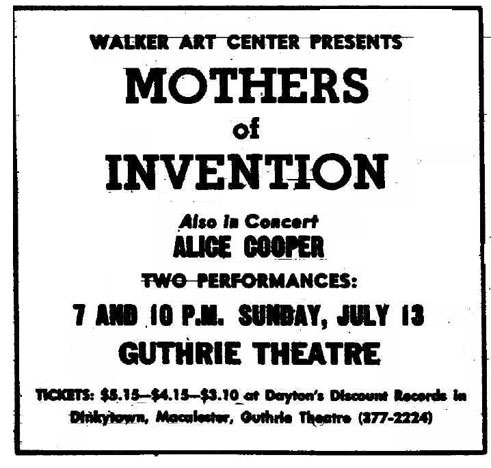
Ad from Minnesota Daily, courtesy Robb Henry
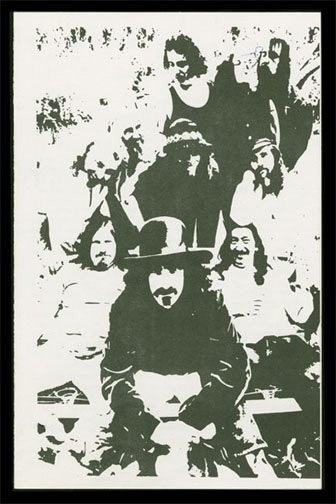
Program cover courtesy Walker Art Center
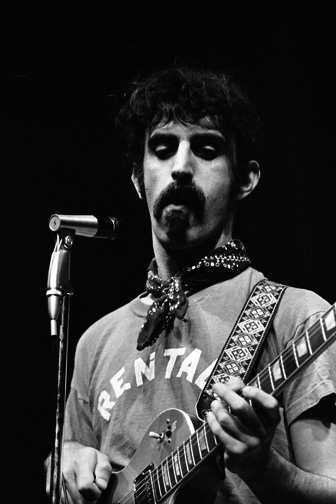
Frank Zappa photo copyright Mike Barich
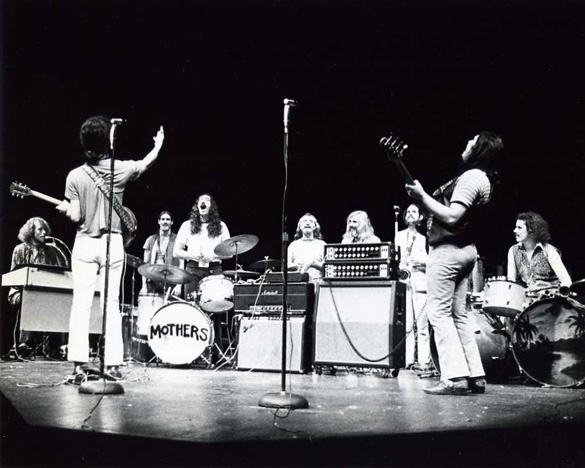
Photo copyright Mike Barich
Mike Steele of the Tribune wrote that the depth and complexity, the subtlety and compelling richness of the Mothers' music could only be appreciated in person, and the performance at the Guthrie "musically tore the place apart." The music defies categorization, and the band includes some of the finest musicians in the business, including leader Frank Zappa, who was called the great musical satirist of the day. The concert was deemed fantastic and exciting, with songs that were few but long.
Tim Bozell, "Mothers Make Music," Minnesota Daily, July 17, 1969
Alice Cooper, Frank Zappa's "discovery" ("Some friends brought them to my house") opened the show. [...]
Frank Zappa, guitarist and head Mother, introduced the Mothers' first piece as one that "they hated in New York." It was a lovely bassoon concerto and the unamplified wind trio delivered it beautifully.
After a teach-in on the rock of the Fifties and the history of "Louie, Louie," the band did an instrumental version of that classic. They added "What will probably become our national anthem," "Sunshine of Your Love," to it, and the result was bizarre and exciting.
The next music they played was the result of five chords, eight notes and three different time signatures called out by the audience. It was nothing but genuine jazz created around an admittedly odd sounding motif. We learned about "browning out," "German ballet" and Zappa's foolings about "Teen America" before they went into their next piece, an instrumental.
This was to be the last number but a standing ovation called the group back to play a "slimy old rhythm and blues" thing.
Acoustically, it was the best sounding theater that we'd ever played in. It was built for music to be played in. After that gig, it was one of Frank's favorite places to play and I think he played there a few times after the old Mothers broke up.
August 3, 1969—Atlantic City Pop Festival, Atlantic City, NJ
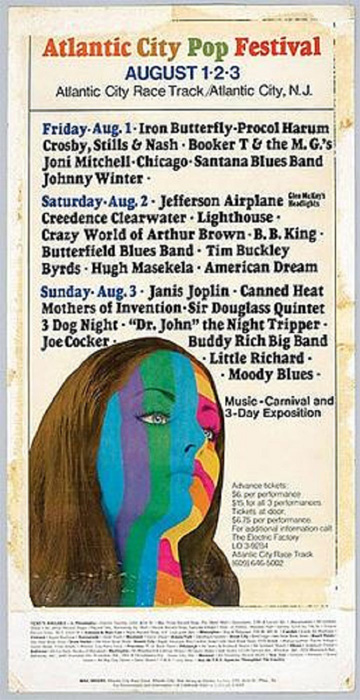
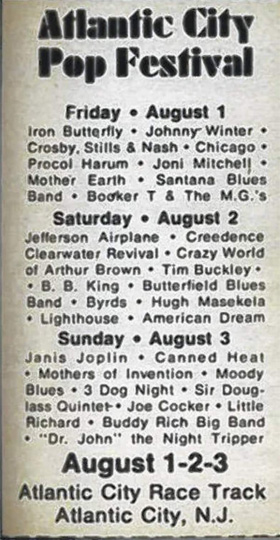
I had the advantage and pleasure of seeing Zappa perform at the 1969 Atlantic City Pop Festival ("King Kong").
Do you recall the largest venue—or largest single audience—you played with the Mothers? Would it be one of the pop festivals in the late 60's, or somewhere else?
I think it would be where you saw us play; The Atlantic City Pop Festival in 1969. There were a lot of people there. The biggest audience I ever played was with Capt. Beefheart at the Knebworth Pop Festival, England in 1975.
D LOWELL ZERCHER
I'll add my memories about a fantastic weekend in 69. [...] First up was Joni [Mitchell], just sitting at the piano and the sound was awful from where we sat. [...] I'll just hit the highlights for me. Santana blew us away and we are going, who is this guy? [...] I believe it was the first night, could be the second, Iron Butterfly doing In-A-Gadda-Da-Vida for 45 minutes, next was CCR, great show, solid, all their hits and then the Chambers Brothers wrapped up the night [...]. It was the high point of the festival for me. Yes, seeing Janis, Canned heat, Dr John, Zappa and the Mothers ( They never moved, just stood shoulder to shoulder and played except for Frank moving his arm to signal! ), a young BB King, Three Dog Night, and many more. I do not remember Joe Cocker, was he really there? I was surprised to see him in the Woodstock Movie with his gyrations, sorry Joe, love your music. Johnny Winters was supposed to finish the festival, did not show, and Little Richard was last or next to last.
Steve from Montreal
I was 16 years old, me and my friend Richard were being squished so bad right in front of the stage during the Joplin concert that our feet were leaving the ground and we couldn't breath, but I remember her boob kept popping out. [...]
Little Richard stripped down to his underwear on top of his piano.
Frank Zappa started off by saying they had no music prepared and he was just going to conduct the orchestra creating music on the spot. It was amazing.
The sound of the cow bell starting off "Time Has Come Today" by The Chambers Brothers still rings in my ears today.
I remember Janis and they two people climbing the light towers during her performance. [...] I could swear Hendrix was there on Sunday as one of the Winters was a no-show! Joni walking off, and Frank joking about cutting his show short. But King Kong was more than enough of a Zappa fix for me. Canned Heat lost 2 or 3 members that week and invited other band members to jam with them. I believe Zappa, Snooky Flowers from Big Brother and the Holding Co, and others doing a unique version of Refried Boogie for about forty minutes. The Iron Butterfly lead guitar player tearing down the track, who I think was only 17 yrs old playing in front of 110,000 plus! For some reason I thought the MC was Billy Preston who at the time was an underground radio DJ from San Fran. He came out and played after Mitchell walked off. I still have my three day ticket stub.
Tony Massi
Coatesville, PA
I was seventeen and just amazed to get so close to the music. I remember Canned Heat being on just before the Mothers. Zappa commented that they were told to do only one set because they had to make way for the heavy groups! I think he meant Janis. He was wearing a shirt reading "truck rental". [...]
Wildcat
I saw an altercation onstage during Zappa's setup and heard rumours that this was planned by Zappa as some sort of "living theatre". Anyone know?
Jimmy
Joan from Atlantic City
[...] I remember Joni Mitchell walking off in a huff. I was a big Joni Mitchell fan, but the crowd was much too fired up to sit still for folk music. I then remember Frank Zappa being disgusted with the crowd's reaction to Mitchell, and playing an entire set of only instrumentals. It sticks in my mind because I was disappointed, wanting Zappa to do some of his more well-know stuff.
Stephen
[...] Later on came Frank Zappa, who announced, somewhat disgustedly, that he had to shorten his set, "To make way for some important acts." Janis came later, and was fabulous, and unless I am hallucinating now, Hendrix closed the show- I say this because I only saw him live once, it was outdoors, and I wasn't at Woodstock!
More Atlantic City Pop Info from Dennis Fenlon
I was there and saw the whole show. I watched John Fogerty from CCR kick a guy in the head who was trying to get on stage. He drew a lot of blood on the guys nose and all over Fogerty's fringe suede jacket. Janis Joplin played twice on Sunday, Santana was billed as the Santa Ana blues band and Carlos corrected this saying ' we are not Santa Ana blues band we are SANTANA then they started with Black Magic woman. Zappa came out and told us that in this time slot he is supposed to prepare us for the heavy groups that would follow ;i.e. lighthouse he then played WILLIE THE PIMP //and then KING KONG well you will have to hear it : I guess you know that lighthouse were ok however frank was fantastic and Chicago were great. Procal Harem gave everybody goose bumps with a whiter shade of pale, the Byrd's were 8 miles high, little Richard stunk. Joni Mitchell quit in the middle of her set :due to the inattentiveness of the large crowd. Ask anybody who was there about the swimming hole in the middle of the racetrack. I met 3 girls from Philly all named Debbie hanging together I wonder where they are now. You forgot Iron Butterfly.
Informants: Charles Ulrich, Javier Marcote, Tan Mitsugu.
The End Of The Mothers
Frank Zappa, "tired of playing for people who clap for all the wrong reasons," has dissolved his Mothers of Invention.
The first indication that the revolutionary nine-member band was aproaching the end of its musical career came with an announcement that the Mothers had cancelled all bookings from now until the end of the year so Zappa could concentrate on other projects long in progress. A talk with Zappa revealed the break was more complete than that.
"It all started in Charlotte, North Carolina," he said. "We'd been booked by George Wein on a jazz concert date as bait to get the teenaged audience. We went into a 30,000 capacity auditorium with a 30-watt public address system, it was 95 degrees and 200 percent humidity, with a thunderstorm threatening. It was really horrendous.
"After that I had a meeting with the group and told them what I thought about the drudgery of grinding it out on the road. And then I came back took to LA and worked on Hot Rats (an upcoming solo album). Then we did one more tour—eight days in Canada. After that I said fuck it.
"I like to play, but I just got tired of beating my head against the wall. I got tired of playing for people who clap for all the wrong reasons. I thought it time to give the people a chance to figure out what we've done already before we do any more.
"The last live Mothers performance was in Montreal. The last 'otherwise' performance was a television show in Ottawa the following night"—August 18th and 19th.
"THE MOTHERS OF INVENTION were a failure because I over-estimated the intelligence of the audience"—Frank Zappa talking in London last week.
"For about five years we were engaged in an experiment to enlarge the audience conception of music, to show that there was more beyond three-chord blues songs with boy-girl situation lyrics. Of course, some people didn't like it.
"I like those sort of songs too, but there are other things. I suppose a lot of people saw me as some kind of perverted Charlatan making ugly sounds with humorous undertones. But I see certain things which are the truth and I live like that. I just tried to tell how I see things. We took things in a straightforward way and took them as far as possible and the few people that did hear and understand were grateful that we didn't talk down to them.
"We should have just dispersed, like liquid does. Jim Black should have joined someone else's group and taught them what we believed in instead of forming his own band. If I had time to go on the road I would like to join a group, if I could find the right one."
Looking back on the
break up obviously makes Zappa feel rather sad. Some members, he says—
for instance Bunk Gardner—are very bitter about it.
"The worst
thing about having a band like that is the responsibility falls on you.
You have to remember, all the time, that the main concern of a
rock-n-roll band is how much money it earns. It's a perfectly valid
stance to take, because these men were earning very little, and some of
them had families—Jimmy Carl Black had five kids.
"So when I'd
announce we had a tour coming up, a few people in a burst of enthusiasm
might go out and spend the money in advance. Then the promoter rings up
and says the tour's off, and someone has to meet that bill, either me or
Herbie (Cohen, their manager, and Zappa's partner in business
ventures). Everybody in the band hated me or Herbie in turn.
"When
I disbanded the group it was as if I'd taken their income away. There
was a lot of mumbling and grumbling. Nobody paused to consider that I
might have been running the band purely on a musical basis. But I would
say during the five years that group was together it was a very good
relationship—we put up with a lot of hardship and misunderstanding."
C: You've said that you're "tired of playing for people that clap all for the wrong reasons." What are the right reasons?
Z: How many words do I get?
C: As many as you want . . .
Z: Well, I'll have to amend that, and say that I think it's okay if anybody claps for any reason at all, these days. When you can see how grim it is out there . . . if you have a reason to clap, go ahead and clap.
C: So you've changed since the time you said that they clapped all for the wrong reasons . . .
Z: Yes, I've changed since then . . . (Jokingly). I was such a bitter person then . . .
C: You're so sweet now . . .
Z: Yeah!
We were on this George Wein jazz tour of this East Coast, with Roland Kirk, Duke Ellington and Gary Burton. We were booked into a hall in South Carolina. Before we went on, I saw Duke Ellington, after all these years in the business, on the same tour with us, begging the road manager for a $10 advance. Swear to God. And the guy wouldn't give it to him. That's like a glimpse into your future.
Concerning the break up of the original Mothers; we had just got back from an East Coast tour, we'd been back about a week when I called Frank to ask him some question or another. We talked for a while and pretty soon he said "oh, by the way—I've decided to break up the band. You guys are now unemployed." I thought that was really cold, but that's the way Frank was. It wasn't a very pleasant experience at the time—we felt we were being very successful and didn't think that was called for, but hey . . .
There was some heavy feelings from the band at the time. It was not the disbandment but the way it was done. I called Frank on the phone for something or another and after about ten minutes of talking, he said that he had decided to break up the band and our salaries (they were really draws, since according to the contract at the time, we all were pardners) had stopped as of last week. It would have been better if he would have given a date, say like six months, and then we all could have made better plans. I felt the same way as the rest of the guys at the time, but didn't hold a grudge against Frank like some of the guys did. I did the later things with Frank, not for him but for myself.
We'd been home about one week, and I got a call from him, on the telephone—it wasn't even in person—on the telephone. [...] We were talking about nothing in particular for about fifteen minutes. You know, just bullshitting. And then he said "Oh, by the way, I've decided to disband the band. Your salaries have stopped as of last week." [...] He hung up after that. I didn't get a chance to react to him. I called the rest of the guys and they said "Yeah, we just got a phonecall from him." Basically did the same thing to them, which to me was very, very cold. You know, not even . . . not even telling you in person.
About a week after we got home, I called Frank to talk to him about something. After a few minutes, he just said, "Oh by the way, I've decided to break the band up, your salaries have stopped as of last week." It was quite a shock! There hadn't been any signs while we were on the tour. [...]
I was the first one to find out, so I immediately got on the phone to Roy. Frank also started to phone everybody but I beat him to the punch with Roy. Then we all started calling each other saying, "What the fuck is going on here?"
When I spoke to Ian, it seemed like he already knew something. I think Frank already had plans for Ian to stay around.
So then we had a meeting, and Herb and Frank did sense that we were a little upset with what was going on with a lot of the business. They kept saying, "There's no money because we're losing all this money!"
[...] At the time, everybody thought that it might have been Herb Cohen who had caused all this crap but we found out later that he was doing just what Frank told him to. Herb became the fall guy! It was decided to pay me and Roy an extra two weeks' salary because we'd been with the band the longest, so that was our little leaving present!
[...] Herb and Frank had been paying taxes on us, so we got unemployment benefits
I believe Frank decided that he wanted to go in another direction.
I think he was just tired of the band, certainly we were criticized many, many times about how badly we played his music. He was very unhappy with certain members of the band. He probably thought it would be less of a drain financially as well, because at that point we were making a salary of $250 a week and I think that was just too much of a drain on him. But, it was his doing and there wasn't much we could do about it. Everybody went their own way—I certainly played with a lot of different bands I around that time.
To explain how that original band broke up is really hard. There are many, many reasons . . . I think Zappa was dissatisfied with some of the performances of the band, the limited nature of some of the people like Roy Estrada and Jimmy Carl Black who couldn't read music—they did play some very complicated stuff, but it just wasn't complicated enough. Zappa wanted the very best sight-readers in the world to read his music, and unfortunately when he got these great sight readers they had absolutely no personality, which is why the band sounded the way it did after that. That's certainly why it looked the way it did, anyhow.
But, who knows what the real reason was in the end? Maybe some of the band were getting laid more than Zappa—I really don't know. But, it was a big shock to all of us, it was like when you've been married ten years and all of a sudden your wife leaves you. It was the same feeling, because we were all of us very close and we'd been doing this for quite a while and . . . it was just a big shock. Some of the guys in the band were so hurt that they never spoke to Zappa again, other than legally anyway. Myself and Ian Underwood appeared in the next two bands, although after a certain point I just couldn't take any more and I left.
For one thing we'd been touring such an awful lot and sustaining huge financial losses. One of the other problems, my attitude was getting very sour because we were working places where it just seemed like I was banging my head against the wall because we had developed the music of the group to a stage where it had really evolved. We could go on stage and we didn't need to play any specific repertoire. I could just conduct the whole group and we could make up an hour's worth of music that I thought was valid.
On the spot it would be spontaneous and new and interesting. It would be creative because the personalities of the people in the group just as much as their musicianship but you stick that in front of an audience that wants to hear songs that are three minutes long and with words about boys and girls in love. It just doesn't work.
No matter what you do instrumentally, get those words about the boy that falls in love with the girl or the girl that leaves the boy—that is the real world!
Anything that is apart from that is not rock and roll. It doesn't belong in their teenage concert halt. It's not something that they can identify with easily. So nobody knew how to take the band. They didn't know if we were Spike Jones with electronic music or whether it was serious. Or what it was.
I just got tired.
[...] At first [The Mothers] were extremely angry at me for breaking up the band. Not because they wanted to play the music but because I had been supporting them. Suddenly I had taken away their income, I said to them: "Look, am I supposed to kill myself going out and doing this over and over again? Well, it's not fun for me anymore." I was really depressed about it. I couldn't do it anymore.
I was frustrated. When you play your music before an audience interested in only one thing, the ultimate pumping of the rhythm section, it can piss you off. It also pissed me off that the band could never drive the way I wanted it to. It sounds rather irrational, but I was constantly torn between two ideals. I didn't like the idea of firing people from the group. At this point, there was only one person I had fired from the first Mothers and that was because he was too stoned to play. No matter what the other guys did, and they abused the shit out of me, I wouldn't fire them. I kept on bringing in new people to make the musical end of things more proficient.
But the band was always down on me because I was their employer. If I'm the guy who's paying the bills, how can I be a human being? I've had the problem with all of the bands. It's strange. Finally it got to the point where I just said "Fuck it." I like to play blues. I like to get out there and boogie. But I like to do other stuff, too. I want musicians who can do both, have the same range of interest as I have. Those guys didn't want to do ANYTHING.
By the time our last tour ended I was $10,000 in debt. But the band got paid their salaries whether they played or not. I had to pay the expense of shipping the equipment and guaranteeing them $250 a week even if we didn't work. I couldn't do it. When I told them that I couldn't do it they hated me because suddenly they were unemployed. How can you deal with people like that?
The discontent within the band was later voiced by Lowell George: "The band at that time was very much like the Lawrence Welk of rock'n'roll. Frank wrote all the charts. Everything was very prescribed. There was no room at all for any emotion. The band felt very hurt and ripped off because Frank was living in a $100,000 house in Beverly Hills and they were all still down in the valley. Frank would write piece after piece after piece and they would all have to play it exact. They were hurt by the fact that he was making more money, but more than that they became more alienated by the fact that he would overwork and become totally inhuman." [NME, February 1, 1975, "This here's LOWELL GEORGE," "excited gibbering," by Pete Erskine.]
September 22, 1969—Jean-Luc Ponty & George Duke Trio with FZ at Thee Experience
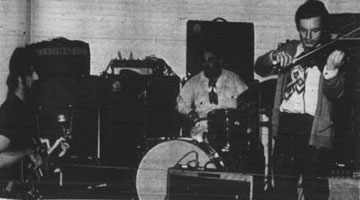
Violinist Jean-Luc Ponty, right, with Mothers of Invention leader Frank Zappa and unidentified drummer join together to unite jazz and rock.
[...] Well, such a mixture occurred last Monday night [September 22, 1969] at L.A.'s newest *in* music refuge, Thee Experience (7551 Sunset Blvd.) and it couldn't have been more successful. World Pacific Records, in a calculated risk, decided to book Jean-Luc Ponty, their contemporary king of jazz violin, into a rock club . . . among rock acts, and see what kind of audience reaction he'd receive. Would you believe . . . standing ovations?
Ponty, looking all the part of a young, French choirboy with violin in hand, was a visual contradiction in himself. So was his music. Quite ably backed by the George Duke Trio (piano, bass, drums) Ponty utilized his violin like a guitar, eliciting bursts of staccato that quickly blended into crescendos of controlled feedback . . . then into softer, more delicate things. [...]
Toward the end of the set, Ponty was joined on stage by Frank Zappa, head Mother of the group that announced this week that they'd be suspending all concerts until the first of the year (they're not, contrary to popular belief, breaking up). As it turns out, one of the reasons the Mothers are resting is to give Zappa time to work on various individual projects.
[...] Ponty and Zappa proved that night that guitar and violin are not such strange bedfellows.
Following Ponty's set, the whole irony . . . the recurring enigma of the music industry presented itself again as the Iron Butterfly, currently America's best-selling rock (and I use the term loosely) group took the stage to do a special hour tour de force of their platinumed recording, "Inna Gadda Da Vida." It seemed almost sacreligous to have them even on the same stage that Ponty used. But . . . that's the music biz.
Pete Senoff, "Thee Experience, Los Angeles," Cash Box, September 27, 1969 (as printed on the cover of Jean-Luc Ponty, The Jean-Luc Ponty Experience With The George Duke Trio Recorded In Hollywood At Thee Experience, Pacific Jazz ST-20168, 1969)
People both in and out of the industry keep trying to put labels and categories to the new, fresh types of music that are emerging continuously via records and live performances. All music, according to them, must fit into a certain mold and stay there. No cross-pollination allowed!
Well, such a mixture occurred last Monday [September 22, 1969] night at Thee Experience and it couldn't have been more successful. World Pacific Records, in a calculated risk, decided to book Jean-Luc Ponty, the contemporary king of jazz violin, into a rock club among rock acts and see what kind of audience reaction he'd receive. Would you believe . . . standing ovations?
Ponty, looking all the part of a young, French choirboy whit violin in hand, was a visual contradiction in himself. So was his music. Quite ably backed by the George Duke Trio, Ponty used his violin like a guitar, eliciting bursts of staccato that quickly blended into crescendos of controlled feedback . . . then into softer, more delicate things. The Trio, led by pianist George Duke, were extremely exciting (playing double-time most of the evenig) and went a long way in contradicting the death of jazz.
But the spotlight was on Ponty. His sound is inmediately reminiscent of Stephane Grappelly, the violinist for Django Reinhardt. But whereas the former was largely relegated to backup chores, Ponty clearly was the lead player on stage. He amply demonstrated his flair for improvisation; the several high-registered codas he emitted from his instrument immediately got the audience, who sat very quietly through his opening number, onto their feet and dancing. They didn't look at Ponty's music as jazz or jazz-rock or any other forcefed label; it had a good beat, was unusual and exciting, and was done with taste. That's all that mattered.
It's significant to note that Thee Experience, unlike most other rock clubs, has an audience made up mostly of musicians. Hence, the ovations Ponty received were doubly-justified.
The set closed with a jam, with Frank Zappa on guitar. It was avant-garde, to say the least.
People ask about the disappearance of enthusiasm in pop music. Well, Ponty attracts enthusiasm and excitement like a magnet.
Jean-Luc Ponty, The Jean-Luc Ponty Experience With The George Duke Trio Recorded In Hollywood At Thee Experience, Pacific Jazz ST-20168, 1969, liner notes
Producer: Dick Bock [...] · Jean-Luc Ponty—Electric Violin · George Duke—Electric Piano · John Heard—Amplified Bass · Dick Berk—Drums
Jean-Luc Ponty With George Duke Trio
Jean-Luc Ponty (electric violin, baritone violectra) George Duke (electric piano) John Heard (electric bass) Dick Berk (drums)
"Thee Experience", Los Angeles, CA, September 24, 1969
[...]
World Pacific Jazz ST-20168 The Jean-Luc Ponty Experience
Baldhard Falk had tipped me off that Jean-Luc Ponty was coming to Los Angeles to record. [...] Many good things happened as a result of these sessions with Jean-Luc.
Actually, we recorded an album at Donte's Jazz Club first. [...] That record was recorded in March 1969, but was not released until many, years later.
Dick Bock, the owner of Pacific Jazz Records thought it would be great for us to record the same music in a rock club. Jean-Luc was not hot for the idea as I remember, but eventually said OK. I was really into playing the piano then, and requested to Dick that they have one there for me to play. Having grown up in San Francisco during the Height Ashbury days, I had been to many rock clubs that had no piano available. Dick promised me there would be one there.
As fate would have it, when I arrived at the gig, there was no piano! The only thing I saw was a silver top Fender Rhodes. I was pissed. Dick had invited all the LA heavies, so, I knew I had to be on anyway. Jean-Luc and I had developed a buzz on the West Coast because of our high intensity progressive jazz style. Dick Bock was convinced that our brand of jazz could get over to an opened-minded rock audience. He was right! I took on the challenge of playing the Fender Rhodes with ferocity. The date was September 27, 1969. The drummer was changed, for what reason I don't remember. Dick Berk was the new drummer.
In attendance were Frank Zappa, Quincy Jones, Gerald Wilson and Cannonball Adderley to name a few. The club was packed! By the way, the name of the club was "Thee Experience."
The first time I met Frank was when he produced the King Kong session for Jean-Luc Ponty. I was working with Jean-Luc at a club in L.A. called Thee Experience, and he insisted that he didn't want to do the record unless I came along with it. He didn't know Frank at that time, so he wanted somebody from his camp to be there. So I did the date, Frank liked me, and it went from there.
[Jean-Luc Ponty] gave me my first shot in the business. I'd sent him a tape and eventually he decided, let's give the kid a shot. I came to L.A. and through working with him I met Quincy Jones, Frank Zappa, and others who would come to see this fabulous violinist, and I just happened to be there playing piano. Now, I knew instinctively that I needed to draw some attention, so I went kind of nuts. I played with my feet. I did everything, because I realized the music business was out there in the audience.
You heard Jean-Luc on the radio and then you chased him down, right?
Yes, they used to play him on KJazz in San Francisco. I had started working with SABA Records and Jean-Luc was on the same record label so I had a couple of his albums. I love those records. And one of the guys from SABA Records told me, "You know Jean-Luc is coming to Los Angeles to make a record. Maybe you can get the gig." I found out who his producer was gonna be and I must have bugged those people to death. They finally just said, "Let's give the kid a shot to get him off the telephone."
We had already started playing at places like Dante's and we had already done some gigs with my trio, the same trio that played with Al Jarreau: John Heard on bass, Al Cecchi or Dick Berk on drums, depending on the night, and myself. So we started doing these dates and Dick Bock, who was Jean-Luc's producer, said, "With the kind of jazz that you guys play, I think that you can get over to a rock audience. So I would like to put you at a club called "Thee Experience"," which was the premier rock club in LA at that time. Jean-Luc was unsure about doing it but I thought, What have we got to lose?! If the audience doesn't dig it then we're out. So Jean-Luc finally said, "Okay if you want to do it I'll do it."
So they booked us in there one night and Dick said, "All you have to do is play the couple of tunes you always do but put a rock beat behind it." And that's what we did. He recorded that night and that came out as "Jean-Luc Ponty Experience with George Duke". There it was. I had said to Dick, "The only thing I want is, make sure there's a piano in there, not one of those little short sawed off Fender Rhodes." I went in and that's all that was, a little sawed off, silver top, 73-key Fender Rhodes. And I was like, "Man, what am I gonna do with this thing?" However, I found out that I could make it louder, I had tone control, I had vibrato. And I was like, "Shoot, I can play as loud as a drummer now!" And that's what happened, I began to dig the instrument. I found throughout all the clunks that I could get some other tonalities and it kind of interested me.
Is this the first time you had played the Rhodes?
No, I had played the Rhodes with Don Ellis. I joined the Don Ellis Big Band for a while. I was pretty comfortable playing a lot of odd time signatures. But working with Don Ellis, who a lot of people probably don't remember, I got bathed in the waters of time signatures. It was an amazing experience. Jay Graydon was in that band, and Ralph Humphrey, who eventually wound up in the Zappa band.

[FZ, Dick Berk, Jean-Luc Ponty.]
Jean-Luc Ponty performing with Frank Zappa and Dick Berk during a George Duke Trio concert at Thee Experience in Los Angeles, September 24, 1969.

Additional informants: Charles Ulrich, Javier Marcote, Ricardo del Campo, Tan Mitsugu.








